Hello friends.
This is the first blog post since the whole affair and I think you all know what I mean by that.
For obvious reasons I can’t elaborate any further for now (I’m sure you can understand why) as that’s a blog post that will not only happen when the time is right, but when I have the emotional and mental capacity to come to terms with it. Suffice to say I hope the time will come soon when I can draw the line, and move on. Because we all have to move on and start engaging again. The world moves on, the world is changing. We no longer live in an “offline” world, our lives are changing in so many ways to connect with the digital world, that connection is no longer enough. We also need to engage if we are to be truly “whole” citizens of the 21st century.
And that’s where I’ll start.
Engaging.
I “Engaged” last Sunday. Big Society style.
I gave up my Sunday (quite willingly and unpaid) to join a group of like minded people in a rather hot office just by Westminster Abbey (where the Cabinet Office’s Technology Strategy Board is living right now) to be part of a workshop that was looking at how we could get the LinkedGov project working.
Communication
I’ve always had issues in communicating… I get frustrated that people just don’t “get it” instantly or being able to distil a complex problem into a simple “vision”, because I have a rather logical and technical mind and don’t understand why people don’t come to the same conclusions as me…. but that’s just me. I can be a bit autistic that way (as friends, family and loved ones constantly tell me!)
I know my strengths, I know my weaknesses. It’s a common failure that logical/IT people suffer from – good communication skills and I am making a conscious effort to improve on this, but I’m also lucky to know people that *can* communicate, that *do* have the patience and saving grace to go out there, navigate that political minefield, and communicate. Enter in one Hadley Beeman, and one Glyn Wintle

Teacamp - Photo Credit Adrian Tritschler http://www.flickr.com/people/ajft/
I first met both Hadley & Glyn at strange thing called Teacamp – Teacamp is a monthly informal get together of digital communicators, web developers / designers, social media specialists who work in government, with government and outside of government.
It’s where we share ideas, solve problems, have a cup of tea/coffee (or a bottle of sparkling water in my case) to learn something new. And hopefully out of all of this communication and collaboration we may just manage to do our jobs a little bit better.
It was because of Teacamp that I began regularly following these two on Twitter and started engaging in them, and more importantly I also consider them to be friends in the “off-line” Real World. We’ve met several times in “real-life”, having the odd coffee… the odd beer… and being rather sad and geeky at the best of times discussing issues close to our heart.
I was always given strange looks by people when attending Gov Social Media type events because I’m not a web/techie/comms person… but that’s the whole beauty of Social media, you shouldn’t need to be any of those types of people to get involved. It all boils down to openness, transparency, collaboration and communication no matter what field of work you find yourself in. Collaboration drives innovation. But anyway… I digress. Back to open data and transparency.
So, why is that? Why did we bother to meet up?
Open Data & Transparency
Well, it’s because we all share a passion for doing things better, and more importantly for open data and transparency. All at the very heart (or should be?) of any Government’s agenda.
Since the introduction of Data.gov.uk we have seen whole swathes of previously unreleased government data being sent out in the cyberspace for all to see, download and analyse. For me, this was just a fantastic achievement.

Developers, institutions and industry had been crying out for access to this data for years (all funded by the tax-payer ultimately), and now it was finally beginning to happen. But it was only the beginning.
Whilst this was massive leap forward in opening up Government data there is a problem.
For my sins, in one of my other jobs as a Civil Servant, I used to work in Treasury. Not only did I work in Treasury but I was on the very project team that designed, built and implemented the COINS System across the whole of Central Government. I’m a geek, but not a true hardcore geek like many of the developers that I met on Sunday at LinkedGov. I didn’t get down to the nitty gritty bits of coding, that’s what the software developers on the project where there to do so. But I managed that process, setting out the high level design concepts, data structures, coding conventions etc.
I will admit that it on a personal level it made my heart swell with a wee bit of pride when I saw that the COINS data was being released into the big wide world. I’d almost given up all hope of ever seeing my “work” out there for people to use because let’s face it – Finance isn’t sexy, it doesn’t really draw in the big headlines.
But it was still awesome to see something that I’d worked on, that I’d once built being opened up to the public. For years, friends and family had asked what I worked on and it was rather had to get across to them exactly what it was I did, but now this was something tangible that they could see and look at!
I’d nipped onto the data.gov.uk website to see what COINS data had been released and indeed what it even looked like and came up against a couple of problems.
- I couldn’t download the file. It was HUGE – my tiny little personal broadband connection kept on falling over.
- Snippet’s of the file that I did manage to see were rather daunting. Whilst it was in machine readable format it had became clear to me that I would need to build an actual database, and use SQL etc to try and sort the data into any meaningful analysis.
- It’s not just COINS data though, it’s the same for any large or even small to medium government datasets that have been released.
- These are complex data releases usually about a specialist subject matter requiring specialist knowledge.
- They require specific skills sets and resources to open up and analyse.
For me, I think that the biggest issue with Open Data & Transparency is Accessibility.
This isn’t a reflection or in any way saying that there’s been a failure by Government here. I will say again, data.gov.uk do a brilliant job. This is a learning curve for *all* of us, public, industry and government alike. We are in a new era of openness and have very much still got to understand the issues around it.
If you are the normal person (and sometimes I think I am), the very idea of downloading huge data sets, using specific programming & interogation languages to try and get an inkling as to what the data is perhaps telling you is rather daunting. It’s not a “normal” skill for most people out on the streets to be able to manipulate (or even download!) these vast datasets.

How do we unlock the data?
Releasing data whilst it can be read as ticking the boxes as being “open” and perhaps “transparent”… I’m hearing and seeing discussions all over the spectrum that actually it isn’t that transparent or indeed accessible. I saw this happening with the release of the COINS data and other large datasets (non-gov as well). The kind of questions that were being raised on and offline that I saw were;
- “I can’t actually download the datasets” – huge gigabytes of data that a normal person’s broadband would struggle to cope with. Accessibility issues.
- “I don’t understand what any of these codes mean” – Specific systems use bespoke codes, they aren’t always consistent across organisations. Lack of understanding of the meaning of the data doesn’t help with transparency.
- “Can someone explain to me what this line of data means? What does that column mean?” – Without understanding the actual meaning of codes etc and the context, it is rather hard to try and attribute any meaningful analysis of the data. Mistakes could be made because of this lack of understanding.Thus not really that “accessible” or “transparent”.
- “Why is this bit of data missing?” – It could be a simple mistake in the dataset, but it’s rather difficult for the person reviewing the dataset to know who to contact about getting that sort of information. Thus muddying the transparency angle.
Without “meaning” and “understanding” of the data that’s been released it’s just lines and lines of data. Unless you are an organisation or a developer with the skills and resources to put behind trying to understand the data, for the normal person out on the street it’s going to be inherently more difficult. Thus Open Data for the vast majority of the public I think, isn’t the be all and end all of everything that was promised when the data was first released;
- It isn’t information – it’s data without meaning
- It isn’t easily accessible
- It isn’t particularly that transparent.
That’s the kind of conversation I found myself having with Hadley and Glyn back in the summer. Whilst life got busy for me and there were many personal and traumatic issues that I had to deal with, I kept in contact with these two and had been following their progress on this issue, discussing ideas, potential problems/barriers and possible way’s forward.
Data.gov.uk is doing a fantastic job in opening up the data to the public, but they have (like all of us) limited resources. They have a huge job in opening up the treasure trove of Government Data, and it’s no small task. So what can be done to help?

What can be done?
This is where Hadley & Glynn come in.
Hadley & Glyn have been working with the Cabinet Office’s Technology Strategy Board in finding out if perhaps LinkedGov can help bridge that gap between open data and accessibility, unlocking the data for everyone.
So what is LinkedGov?
I will try to explain that in my usual hamfisted way!
Quite simply it’s about how can Open Government Data be improved, and made more accessible to the “man on the street”. I don’t think that you should need to be a developer or large organisation to be able to access Government Data. By “access” I don’t mean just being able to link or download the data, but to be able to actually use it meaningfully without trying to learn new coding languages.
Hadley had started formulating ideas around this (which I strongly urge you to look at http://hadleybeeman.posterous.com/how-are-we-going-to-improve-government-openda)
First of all just setting out the landscape, the “vision” for what LinkedGov is trying to achieve.
-
- There’s lots of data held within Government and it’s now beginning to be published, but all in different structures, formats, codes etc. This is in keeping with Sir Tim Berner’s Lee “Raw Data Now speech”
- Developers and organisations are now starting to analyse that data, build applications around these data sets
- Longer term, hopefully people will be able to access that data or the analysis of that data via simple questions in a web browser or an application from a smart phone
- Once people start accessing the data easily hopefully they can learn more about their public services, government etc and make more informed decisions about how they interact with Government, and what services they use.
As a vision to have, I think that it’s damn good vision to aspire to. The best things come out of simple ideas around how can we do things better.
And the workshop on Sunday was just about all that. Full photo’s can be seen at my Flickr page
I looked around the room (rather bleary eyed for a Sunday morning) to see a wide range of people (Coders, Developers, Civil Servants, people interested in Public Sector data, Industry people) all giving up their own free time to sit around and discuss the LinkedGov Project and how we could possibly make it work.
Kicking off the workshop
The day started off with Glyn & Hadley doing a double act, kicking off the intro workshop setting out the high level vision and asking us to write a word on the board associated with the project;
Once the words were up on the board we were each given a “stress ball”. And any time either Glyn or Hadley said one of these “forbidden” words were were to throw these “balls” at them.
Suffice to say Hadley was better at not saying the words than Glyn… he got hit an awful lot! Joking aside, it was a good way to break the ice and to get some energy in the room, as difficult as it is on a cold Sunday morning.
We talked around various issues from the high level concepts of the project to data formats, accessibility, API keys etc, how to get the data updated, how should it be presented? etc but also Glyn & Hadley to set out exactly what the project wasn’t.
- It’s not about getting local government officers and civil servants to do more work. This will be voluntary. Linked Gov is looking at ways to make it easy for people across all discipline’s to contribute and help clean up open gov data sets, and where you can perhaps give it the additional meaning and context.
- If you are the expert in a particular field can you spare 2 minutes to answer a couple of queries around a particular dataset? How can LinkedGov do this easily? Questions on screensavers? Set up a reward system? Make it game based? Set up Open Data champions in Public Sector Organisations?
- Very much “tell us once”. Once the data has been updated and explained it’s then there for developers to build apps/API’s on, and not have to keep on asking for definitions once it’s been defined.
- It’s not about replacing existing services i.e;
- These services already deliver to an existing market and are well placed to do so. Linked Gov is setting out to try and clean up the data and also make more accessible.
- It’s not about providing an analysis of the data i.e. political analysis or publishing an analysis of the data. That’s for journalists, politicians, self interest groups to do. Not LinkedGov.
Lunch
So, once we’d worked through all of that… it was time for lunch.
As the pizza was wolfed down, as you do at many of these types of events you get talking to people over lunch and I met up with so many people who were brimming full of ideas and enthusiasm for this project which was very hopeful to see. The discussions were far and wide ranging from;
- Longer term vision for Government with open data
- The need for perhaps common data standards across public sector bodies
- How do we get industry involved in being part of the solution?
- Social Media & Distributed communities
Interesting discussions, and something that I could perhaps spend a day each on! But alas there was only time to focus on LinkedGov today
The Afternoon Session – Game on
So, it was soon time to head back into our specific discussion groups looking at specific tasks. Getting into some of the detail as to how LinkedGov could actually start getting this project off the ground with real tangible deliverables ;
Comms
– Developers
– Stakeholders
– Game players
– Documentation, websites, wiki’s, forum threads, mails, Tracking progress
– Communication & Collaboration – how can this be encouraged in the different communities? Hearts & Minds
Game Play
This wasn’t a group that I sat in, but as you can see from the whiteboard a lot of thought had gone into how to make LinkedGov interesting for those that choose to participate once it’s up and running.
Tasks
I wasn’t in this group either, (too busy getting all comms focused in Hadley’s group!), but you can see from the Whiteboards & Flipcharts that this group was focusing in breaking down what tasks needed to be done programatically, and how they could possibly start going about that.
Regroup & Review
Finally we reconvened together in the main room to discuss what we’d been working on all afternoon well into the darkness of the night.
It was an intense day, and whilst we were getting our heads around the high level concepts and starting to formulate strategies and ways of trying to build and implement such a product, there was also time for pause and reflection on the risks.
As with any project it’s got inherent internal and external risks;
- Highly ambitious timetable
- Reliance on volunteers to give up their free time to build and participate
- Getting sufficient high level buy in
- Getting adequate funding and sponsorship
- Technical barriers (technology wise, this can be built we thought but it’s how it’s rolled out across Gov that may be a potential barrier)
- People/internal politics barriers
There’s still a lot to do and a lot more to work on from a people/technology perspective. But I don’t think that any of these issues are instant show stoppers, but they do have the potential to be. It’s going to be down to the LinkedGov Project team to show us how to rise up and deliver to these challenges, and I for one think that if anyone can do it, these guys can. Which is why I’m giving them my support and will help in what ever way I can.
For me, more than anything what I got out of the day was a sense of hope. Hope that there are people out there who are willing to give up their own free time, to help free up and make open data more accessible to the public.
I think that this can be done.
More importantly, I think it *needs* to be done.
Are we necessarily the right people to be doing it though? That I’m not sure, but then again I don’t see anyone else stepping up to this challenge apart from the LinkedGov team. Big Kudos for them for doing so.

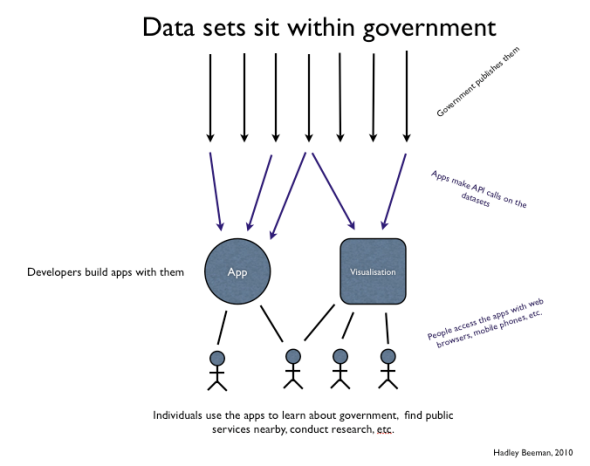
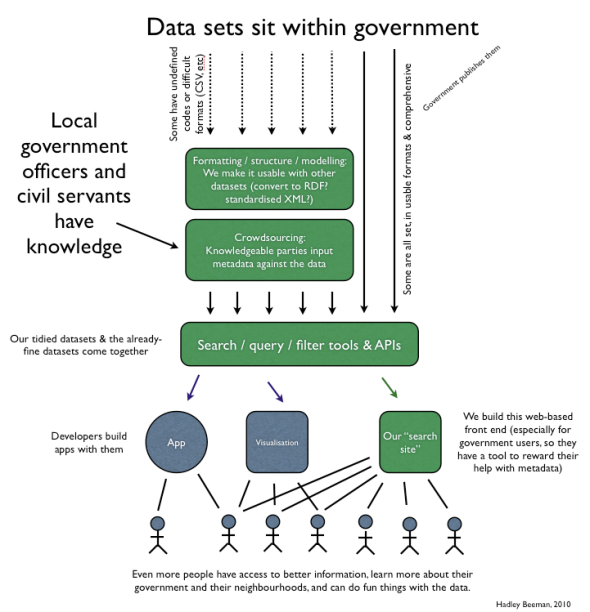
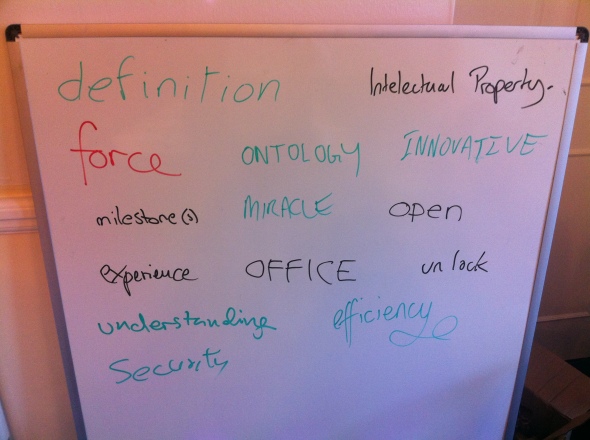
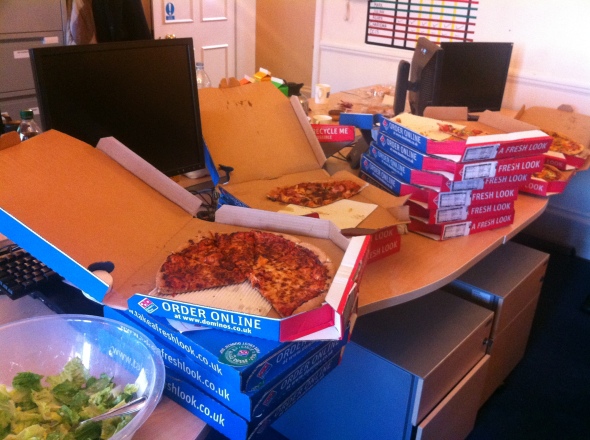
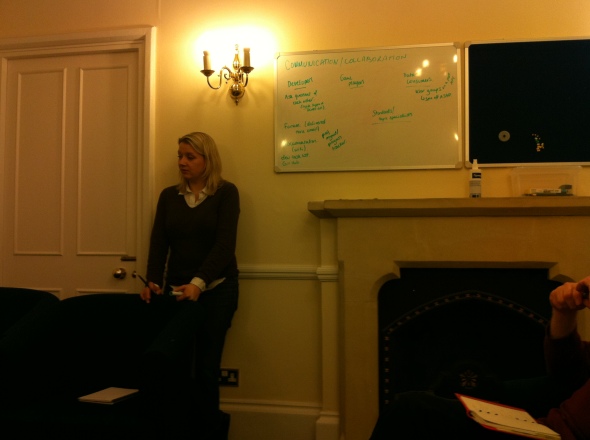
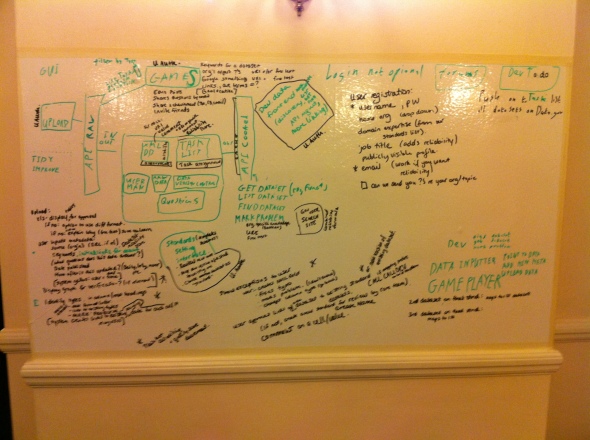

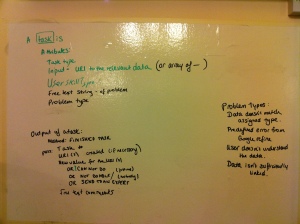
Pingback: Tweets that mention Once more unto the breach, dear friends – LinkedGov « Baskers World -- Topsy.com
Thanks for the update – I was gutted not to be able to make it.
One issue that bothers me – and that I didn’t see explicitly – is usability.
It needs to be usable for civil servants to add data.
It needs to be usable for lay developers to get their hands on the data and do *something* with it.
A lot of that is documentation, and UI for tools. The problem with that is volunteers who only want to work on the “exciting” stuff.
I know from my own experience that if I’m giving my time freely, I’d rather do something cool than update an FAQ.
Still, we’ll get there in the end. I’m sure of that.
Thanks once again for the write up – I’m looking forward to helping any way I can.
Hi Terence,
It would have been lovely to see you there, but perhaps next time?
I wasn’t in all the sessions, but I do recall some talk about usability of the data from both the perspective of the Civil Servant (as they need to be in a position to also contribute to the project meaningfully) but also for the developer.
I’m terrible with names etc but I’m sure there was someone particularly interested in this angle and also the User Experience – there was specific focus on that on how we use that as the “hook” to get engagement from Public Sector workers. I had ducked out the main developer sessions to catch up with Hadley’s group, but I’m sure Glyn and Hadley won’t have forgotten this very important issue!
If civil servants and developers can’t use it and have much faith in the data…..then there’s very little point! LinkedGov has to tackle this.
I look forward to seeing what happens in the future with this project and to working with more volunteers!
🙂
An epic post there, Baskers. Great for those of us who didn’t make it but still want to follow this interesting project – so thanks.
And I don’t think you got strange looks when you started to coming to gov social media events. I’m sure it was just admiration 🙂
Lol… I reckon it was the echoing silence when I mentioned the word “Finance” when I was describing what I did that gave it away!
But I am pleased to say that over this last year I have seen a slow but steady change in the teacamp movement with more and more people from diverse backgrounds starting to attend.
Social media is helping us to collaborate in ways that we would never have dreamed of before, or would have had the opportunity to.
This project is a good example of that 🙂
Hey Baskers,
Great to see that you posting again. I’ve missed the blog. You are quite right about the issue of accessibility. I remember having a look at some of the COINS data when it was released last year amidst much media coverage and just staring at the screen having no idea what to make of it.
Glad you are back taking up bandwidth one more, Stuart.
I’m glad you made time to blog about this event. Thank you for sharing and for writing about it in a very readable style.
If I’d been in London, I would love to have attended this.
I’m very interested in data standards in the public sector. My particular interest is in culture, especially heritage, but I see that as all potentially linked to other domains within public sector. I have been very interested for the last decade in how we can all try to put in place the elements that will enable the Semantic Web to work.
I’m still trying to understand why and where there are problems and whether I can do anything to help.
Hi Janet,
Some day…. we’ll meet 🙂
I think you are right to see the potential linkages. Although my background has mainly been in finance I can see quite easily how a project like this can be used for all types of datasets across the entire Public Sector spectrum.
I also see this project as part of a evolutionary process about how we *think* about our data, how we store it, how we publish it, how we manage and maintain it.
I don’t think until very recently that data was seen as an actual “asset” to an organisation, more than often it was probably viewed as a boring but necessary overhead to have – but we are living in changing times. The internet and the open data & transparency agenda’s are influencing one another in ways that perhaps policy makers haven’t quite understood or have yet to learn, accept and adapt to.
I don’t know where this project will take us, but it’s a start. More importantly perhaps this project can help us understand the unforseen and un-intended consequences of Open Data & Transparency and maybe help light the way forward for others to follow?
There is a lot to be done here…. but as I see it. Think big. Start small. 🙂
There’s been another good write up of the Linked Data Project here;
http://www.disruptiveproactivity.com/2010/12/thoughts-on-background/ that you might want to read
Thanks, Sarah – you’ve just put a piece of the jigsaw in place for me.
I have always seen data as an ‘actual “asset”‘ – I hadn’t realised that others might not. The fact that my work from the start of my working life involved archives made me think about the organisation, retrievability and unlocking of the information in records.
I still feel pangs about some spreadsheets on 5 1/4 inch floppies that I left in a box over 12 years ago after someone disposed of the only PC in the office that could read them. I expect someone just threw them away as useless. They contained data about finances that could provide useful comparisons today, and why a certain policy or 2 might not work…But maybe I’m one of the few people who could have interpreted that data anyway.
I shall dig deep amongst my files to find some old spreadsheets to show you when we finally meet… 😉
Pingback: Some background thoughts on direct action in an internet enabled democracy. | Disruptive Proactivity.com
A view from the colony: what you have on your hands is primarily a data migration problem.
The way i see it is each database was created with one or many projects. Each project should have created a data dictionary. Many probably didn’t but that’s life.
If you could simply consolidate these docs into online consolidated versions you do two things.
1 you standardize enterprise terms and put an important and often neglected project activity in the view of the public which increases quality in it projects
2 you are informing the public what the data means.
At this stage you can.leave it to third parties like the media or visual info community to make it more reader friendly.
Good work and good luck. I look forward to when our .gov gets to this agenda.